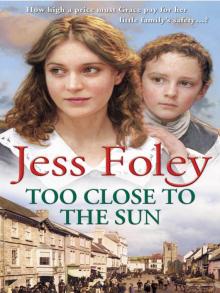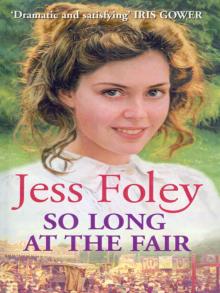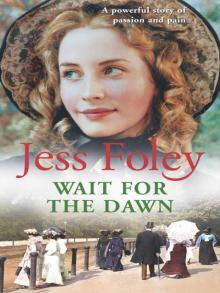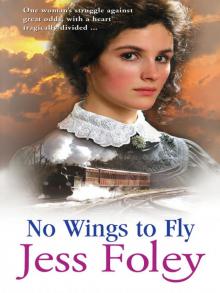- Home
- Jess Foley
No Wings to Fly Page 4
No Wings to Fly Read online
Page 4
‘No, sir.’
‘No, and indeed why should you? And it’s just as well she went of her own accord afore she was pushed.’
Mrs Haskin looked up from the food she was preparing and said, ‘The girl don’t need to know all our business, Father. She’ll have enough to do looking after her own affairs without bothering with ours.’
‘And right you are,’ Mr Haskin said. ‘Right you are.’
Later on Lily sat down to eat with the couple, and was relieved to find that the simple supper of cheese, pickles and cold ham was good. After they had eaten, she set about washing and drying the dishes, and then it was time for her to go to bed.
PART TWO
Chapter Three
As Lily made her way through Whitton’s small park, she hitched the basket more securely over her arm and looked up at the heavens. The July sun had made an attempt to shine earlier on, and had succeeded for a while, but now clouds had come drifting over and the sky was turning grey and threatening. She just hoped that the rain would keep off, for she had brought no umbrella.
In her basket she carried a package containing a pork pie, two pickled eggs and some bread and cheese – Mr Haskin’s midday dinner which he had forgotten to take along with him earlier that morning. It was not the first time it had happened during Lily’s employment with the family.
The year now was 1866, and it would soon be three years since she had come to Whitton to begin her work with Mr and Mrs Haskin. Thinking of it sometimes lately, she could scarcely believe that so much time had gone by – how, almost unnoticed, the days had slipped into weeks, the weeks into months, and the months into years. It had, generally, thankfully, been a painless process.
Following her arrival she had settled fairly swiftly into a routine and was very soon going about her duties as a matter of course. She had been relieved to find also, that after initial misgivings about Mrs Haskin’s rather sharp manner, for the most part she got on well with her. As the weeks passed, Mrs Haskin had seemed to relax and soften in her manner towards the girl, and, evidently, to judge her worthy of her bed and board and £12 a year. Even so, Lily had to watch her step, for there were occasions when her mistress would be prone to outbursts and passions, and a slip in Lily’s work might result in a sharp rebuke, or on very rare occasions, a quick dig with a hard hand.
As for Mr Haskin, Lily had come to know him little better as the time had passed. He was altogether different from his wife. He appeared an easy-going man and, though not much of a one for conversation, was invariably pleasant to Lily. He seemed to regard her with a rather tolerant amusement, for which attitude she could find no reason. A wheelwright by trade, he owned a third of a partnership in a small carriage-construction company, by name of Silver and Son, on the eastern side of Whitton, making – and also repairing – smart broughams and phaetons for those who could afford such things. He loved his work and was closely involved in all aspects of the manufacture of the carriages, from the setting of the springs to the sewing of the upholstery. He worked long hours, leaving home in the mornings just after seven, and not returning until seven in the evening. Even at weekends he would frequently end up at the factory. Usually he rode on his chestnut cob for the mile-and-a-half journey, though on occasions he would hitch up the trap.
Lily had often visited the factory during her time in Whitton, usually to take Mr Haskin some message, or to deliver some food or item that he had perhaps forgotten or which was not ready at the time of his leaving the house. On her first visit, soon after her coming to Whitton, he had taken pride in showing her around the workshops, and with fascination she had watched the men at their various tasks, observing them at different stages of the carriages’ construction, as they built everything, starting with the first basic part, right to the final polish on the woodwork. She had been impressed, and the thought came to her that perhaps one day she too might go and work there. At present there was only one female in Mr Haskin’s employ, but Lily reckoned it was only a matter of time before there were more.
Lily’s continuing employment with the Haskins was now a matter for some consideration for her. She had turned eighteen earlier that July and had already stayed on longer than was usual in such a domestic position, particularly when it offered no chance of betterment. It was time, she had begun to tell herself more and more, to move on somewhere else. But where was she to go, and to do what? What she had most set her heart upon – becoming a schoolteacher – had been put beyond her reach, and she could think of nothing else that she was fitted for or that she wanted to do.
Going by way of the little borough park saved Lily a tedious walk through the hard-paved streets. The park also offered a more attractive outlook with its wide, smooth sward and trees of poplar, beech and elder. It offered, too, the occasional bench beside the meandering pathways, and as Lily approached one of them she decided to sit for a few minutes and take in the view. She would cool down too; for all that the day was overcast, it was humid and rather uncomfortably warm.
She stepped towards the bench, and as she did so she saw a book lying on the seat. She sat down and in the same moment took it up.
There were not many books in the Haskin household, and the few that there were Lily had read, some more than once. Sometimes she got books from the Munie circulating library, but she wasn’t always in the house when the library van came by. She greatly missed the Mellers’ crowded shelves at the farm in Compton Wells.
The book was a copy of M. E. Braddon’s novel Aurora Floyd, and seeing the title on the cloth-bound cover she felt a touch of disappointment, for she had read it only the year previously.
She flicked through the pages of close-set type and read the odd paragraph, immediately remembering the story and the characters as they appeared again. As the minutes passed she soon found that she had read three or four pages. For all her interest, though, she was conscious of the fact that she had taken up something that did not belong to her. She looked around. A group of boys were playing football some distance away, an elderly couple were strolling along one of the paths, and a small boy came by bowling a hoop, encouraged by his doting mother. There was no one who looked to be in a search of a forgotten book.
What should she do? It was almost certain to rain before the morning was out, and if she left the book behind it would simply be ruined. Also, although she had read it, she might quite enjoy reading it again. With only a moment’s hesitation she put the book into her basket beside the little parcel of food. Then, with one last look about her to reassure herself that no one was regarding her with suspicion, she got up and started away.
Fifteen minutes later she had moved across the southeastern corner of the small town and was turning up the cobbled drive of the carriage factory, towards the workshops.
Apart from adjoining offices where the clerks and the managers sat, there were three main workshops: one where the carriages were constructed, another where the paint and varnish work was done, and a third where the upholstery was fitted. Lily made her way into the first one, where amid the noise and heat from a forge, four perspiring men were making iron parts for the chassis of a brougham. Standing just inside the doorway, she peered to see if one of them was Mr Haskin, but he was not among them. After a moment a man with a hammer wiped a hand across his brow and came towards her. She recognised him from past visits as one of the company’s foremen. He smiled at her as he approached and said over the noise of the hammering, ‘It’s Mr Haskin’s girl, am I right?’
‘Yes, sir.’
‘Mr Haskin’s been called away, but he said he won’t be long, if you want to wait for him.’
‘I brought his dinner,’ she said.
‘Oh, well, if you just want to leave it,’ he gestured with his thumb, ‘you can put it in his office.’
Lily thanked him and moved back out into the yard, glad to get away from the heat of the workshop, though the air outside was oppressive too. Above her head the clouds were gathering more darkly than ever. Over the cobbles, she made her way
to the low buildings at the side, in which the offices were housed, and opened the door that led into a small ante-room furnished with a small table and a couple of chairs. Crossing the room, she knocked on the door to a room opening off. As she anticipated, there was no reply, and after a moment’s hesitation she pushed it and went in. She had been in the room several times during her visits to the place, and little had changed over that time. Mr Haskin’s desk, unencumbered except for a few papers and ledgers, faced the window. She took from her basket the package containing his dinner, put it on his desk and started back towards the door. As she did so there came a hard flurry of rain on the window pane, and she turned and saw it furiously lashing against the glass.
Moving from the office, she stepped out into the little ante-room and closed the door behind her. Standing beside the small table she looked out into the yard. There was nothing for it but that she must wait. She sat down. A few moments passed while she watched the rain streaming down the glass, and then she thought of the book, and took it out of her basket. Minutes later she was absorbed in the story.
She was disturbed out of her preoccupation by a knock, immediately after which the door opened, and a tall young man stepped into the room.
‘Hello,’ he said, taking off his hat, and closing the door on the rain-swept yard. ‘I didn’t expect to find anyone here. I’ve come to see Mr Haskin.’
‘He’s gone out,’ Lily said.
‘Yes, they just told me. They said I should come in here and wait for him.’ He put a leather briefcase on the table along with his hat. As he brushed a hand over the rain-dampened shoulders of his light-coloured jacket he said, ‘I came out without an umbrella. These summer storms are not to be trifled with, are they?’ He gave another flick at his sleeves and ran fingers through his hair. His hair was darker than her own. He had grey eyes, and his face was broad, with chiselled features. He was, she would have said, handsome in a rather angular fashion. He appeared to be somewhere in his early twenties.
‘Well,’ he said, ‘I suppose I might as well sit down.’ He moved to the other chair, one with a tapestried back and padded arms. A little silence fell, touched only by the sound of the rain. Not wishing to appear unsociable, Lily closed the book and laid it before her on the table. After some moments the young man said, nodding towards the window, ‘It doesn’t look as if it’s going to let up too soon, does it?’
‘No,’ Lily agreed. ‘It certainly doesn’t look promising.’
‘If Mr Haskin’s been caught in this, it could be any time before he gets back. Are you waiting to see him too?’
‘No. No, I just came to bring him something from his home. His midday dinner. He went off without it.’
‘Oh, I see.’ He smiled, showing white, even teeth. ‘And something nice, I hope. Something worth your getting caught in the rain for.’
She gave a little chuckle. ‘A pork pie and some pickled eggs.’ How banal it sounded.
He added his chuckle to her own. ‘And very nice too, I’m sure. Are you his daughter, may I ask?’
‘He has no daughter. No, I work for him.’
‘Here at the factory?’
‘No, at his home. I’m general maid to him and his wife.’
‘I see.’ He paused. ‘And – may I ask your name?’
‘Lily.’
He smiled broadly. ‘Well, hello, Lily. My name is Joel.’
She smiled back. ‘How d’you do.’
‘Have you been working for the Haskins long?’
‘Three years now. Almost to the day.’
‘Quite a while. Are you a Whitton girl?’
‘No, I’m from Compton Wells.’
He nodded. ‘I know of it.’ He took out his watch and consulted it. ‘Getting on for eleven, but I’m in no hurry.’ He dropped it back into his waistcoat pocket. ‘You’re living here now – in Whitton, right?’
‘Yes. On the other side of the park. And you? Are you from round here?’
‘No, my home’s in Corster. I came to see about my father’s carriage. It was in an accident and it’s being repaired.’
‘I see. And did your boss give you the day off to come and see about your father’s carriage?’
He grinned. ‘My father is my boss. For the time being, anyway. I’m down from university for the summer break, and helping him out where I can.’
‘Oh, you’re a student. What are you studying?’
‘Law. I’m at Cambridge.’
She smiled. ‘I’m impressed. I hear there’s lots of money in being a lawyer. Judging by Mr Dickens’s Bleak House, anyway. How much longer have you got at university?’
‘One more year.’
‘And then into the big wide world.’
‘Well – we shall see.’
‘I was a student for a time,’ she said a little wistfully. He was easy to talk to, and she felt the need to tell him. ‘I was studying to be a schoolteacher.’
‘Oh? What happened?’
She shrugged. ‘Things – got in the way. I had to give it up.’
‘Oh,’ he said, ‘that’s a pity.’
She nodded. ‘Yes – so I came here to Whitton – to work for Mr Haskin and his wife.’ She fell silent again; she was telling far too much to this complete stranger. She glanced towards the window. The rain’s initial fury was fading. ‘It’s easing a little,’ she said.
‘It looks like it,’ he said with a nod. Then he added, glancing at the book on the table, ‘I see you came prepared for getting caught in the rain.’
‘Oh – this . . . I found it, on the way here.’
‘You found it?’
‘It was on a bench, in the recreation ground. It had just been left there. I thought it would be ruined if the rain came on.’
‘No doubt it would. May I?’ He got up and picked up the book, looking at the cover. ‘Do you like Miss Braddon’s sensation novels?’
‘Well – I’ve read two or three – including this one. But I might read it again.’
‘I haven’t read it – though I believe half the housemaids in Britain have done so.’ He set it down on the table. ‘What’s it about?’
‘It’s about a rather headstrong woman who commits bigamy.’
‘She sounds monstrous.’
Lily gave a little laugh. ‘Oh, she does it mostly through carelessness, I think.’ She shook her head, and added ironically, ‘And now I’m beginning to think perhaps I should have left the book where it was – but I get short of things to read.’
With scarcely a moment’s hesitation, he turned to his briefcase, opened it and took out a book. ‘Here,’ he said, ‘you can borrow this, if you like.’
She took it from his outstretched hand and looked at the cover. ‘ Mary Queen of Scots. I’ve read a little about her, but not a whole book. Oh, I’d love to read it if I may.’
‘Of course. I’m happy to lend it to you.’
She smoothed a hand over the book’s cover. ‘I can’t guarantee how soon I’ll finish it.’
‘That’s all right. I’ve got other things I can read.’
‘But you were in the middle of reading it yourself.’
‘I’d only just started it. I can begin again when you bring it back.’
‘And how will that be – that I bring it back to you? I can’t run up here just when I feel like it, and it’s not often I get sent here on an errand.’
‘Well, I could meet you somewhere.’ He paused. ‘Couldn’t I?’
‘Well – perhaps . . .’ Her voice was hesitant. ‘I don’t get much time off.’
‘But you must get some.’
‘Yes, of course. And I have certain errands that take me away from the house.’
‘Oh?’
‘Well, for one thing, on Sundays I go to get midday dinner for Mrs Haskin’s mother. She’s over in Henhurst, and I often get a few hours off during the afternoon.’
‘Oh . . . and have you got some time off this coming Sunday?’
‘Yes, I have – a little. Afte
r going to see Mrs Shalcross.’
‘What do you usually do with your time off?’
‘Well, if the weather’s nice, I might go for a little walk in the park. Or on a few occasions I’ve taken the train into Corster. Just to have a look around – when I’ve got a bit more time, that is.’ She glanced out through the window. ‘Look, the rain’s just about stopped now.’ She still held the book he had given her. ‘Are you sure about lending me this?’
‘Oh, absolutely.’
‘Thank you.’ She took up the copy of Aurora Floyd, and put both books into her basket.
‘Are you going so soon?’ he said.
‘Yes – I must get back.’ She moved a hand to her bonnet strings and adjusted the bow.
‘So . . .’ he said, ‘d’you think we might meet on Sunday? When you’re through getting the old lady’s dinner.’
Her heart began to beat a little harder in her breast. ‘Well – yes – perhaps we can.’
‘Good.’ He smiled. ‘What time d’you finish?’
‘By the time we’ve eaten and I’ve washed the pots it’ll be about half-past two.’
‘I could come to meet you there in Henhurst – or wherever you like, come to that. If the weather’s fine we could walk in the park.’ When she did not answer, he said, ‘Well – what d’you think?’
‘Yes. Yes, we could.’
‘Then I’ll meet you at the park, shall I? Is that convenient for you?’
She nodded. ‘I have to pass by the gates on my way home.’
‘Even better,’ he said. ‘I’ll be waiting by the gates. Say quarter to three?’
Another nod. ‘All right.’
‘If it rains I’ll wait in the bandstand shelter.’ He was gazing at her intently, and she shifted her eyes to the window again. ‘The sun’s trying to break through,’ she said. ‘I’d better go.’
He reached out and took her right hand in his. ‘I’m so glad to have met you, Lily,’ he said, shaking her hand.
‘Yes . . .’ she said, feeling utterly foolish. She was so aware of the touch of him, his skin against hers, the feel of her slim hand held in his broad grasp.

 Too Close to the Sun
Too Close to the Sun So Long At the Fair
So Long At the Fair Wait For the Dawn
Wait For the Dawn Saddle the Wind
Saddle the Wind No Wings to Fly
No Wings to Fly